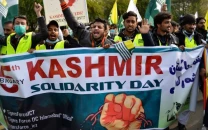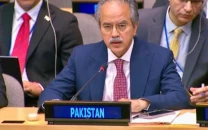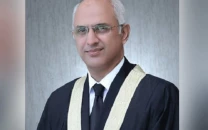PM consults allies on caretaker set-up
Shehbaz takes coalition partners into confidence on NA dissolution on August 9

Prime Minister Shehbaz Sharif on Friday held yet another round of consultation with leaders of the allied parties on the name of caretaker prime minister as the government was about to complete its constitutional term.
In a meeting, the prime minister took the leaders of the allied parties, including PPP Chairman and Foreign Minister Bilawal Bhutto Zardari, PDM and JUI-F chief Maulana Fazlur Rehman, MQM-P’s Khalid Maqbool Siddiqui, BNP-M’s Akhtar Mengal, JWP’s Shahzain Bugti and NDM’s Mohsin Dawar, in confidence regarding the caretaker set-up and dissolution of the National Assembly on August 9.
Following the deliberation, sources in the ruling alliance said, the heads of the allied parties lauded Shehbaz’s roughly 15-month government and expressed satisfaction with his leadership.
During the meeting, they said, the leadership of the ruling alliance deliberated upon different names for the caretaker prime minister and gave different suggestions about the future course of action.
The ruling coalition has held several meetings regarding the caretaker set-up but hasn’t yet reached any decision.
Read more: Riaz, Shehbaz to consult on interim PM
On Thursday night, Shehbaz had formally told leaders of the allied parties that he would send the advice to the president for the dissolution of the National Assembly on August 9, hoping that the consensus would be reached on the caretaker prime minister’s name by then.
According to the Constitution, the assembly will stand dissolved as soon as the president would sign the advice. Article 58 of the Constitution (dissolution of the National Assembly) states that the president shall dissolve the National Assembly if so advised by the prime minister; and the National Assembly shall, unless sooner dissolved, stand dissolved at the expiration of 48 hours after the prime minister has so advised.
Among those whose names have been taking rounds include former prime minister Shahid Khaqan Abbasi, an independent lawmaker from Balochistan Aslam Bhootani, former finance minister Hafeez Sheikh and former principal secretary to prime minister Fawad Hassan Fawad.
Initially, incumbent Finance Minister Ishaq Dar’s name gained traction for the caretaker prime minister’s post but the PPP objected to it. However, it hasn’t yet been clarified if Dar is still the race or not as Prime Minister Shehbaz has neither rejected nor objected to his name.
Soon after Dar’s name surfaced, the information minister had clarified that the appointment and announcement of caretaker prime minister would be done as per the process given in the Constitution of Pakistan.
In this regard, the minister had said that the prime minister would seek guidance from PML-N Quaid Nawaz Sharif and consult with the heads of the coalition parties in the government.
According to the Constitution, she said, the prime minister and the leader of the opposition would complete this process through consultation, adding that the name of the caretaker prime minister would be announced at the appropriate time.
In background discussions, several leaders of the ruling coalition didn’t hesitate to say that Nawaz would take the final decision about the caretaker prime minister, adding that he might consult PPPP President and ex-president Asif Zardari and PDM chief Maulana Fazlur Rehman on the subject.
Giving an example of the army chief’s appointment, they said, it was Nawaz who took the final decision, which was formally announced the incumbent prime minister, Shehbaz Sharif.
Commenting on the on-going deliberation on the caretaker prime minister’s name, a senior leader quipped that the exercise was nothing more than a formality as the decision would be taken by the bigwigs of the coalition parties and conveyed to prime minister.
Under Article 224 (1) of the Constitution (time of election and by-election), a general election to the National Assembly or a provincial assembly shall be held within a period of 60 days following the day on which the term of the assembly is due to expire, unless the assembly has been sooner dissolved.
Under 224 (1A), on the dissolution of the assembly on completion of its term, or in case it is dissolved under Article 58 or Article 112, the president, or the governor, as the case may be, shall appoint a caretaker cabinet.
Provided, it says, the caretaker prime minister shall be [appointed] by the president in consultation with the prime minister and the leader of the opposition in the outgoing National Assembly, and a caretaker chief minister shall be appointed by the governor in consultation with the chief minister and the Leader of the opposition in the outgoing provincial assembly.
It adds that if the prime minister or a chief minister and their respective leaders of the opposition do not agree on any person to be appointed as a caretaker prime minister or the caretaker chief minister, as the case may be, the provisions of Article 224A shall be followed.
Provided that the members of the federal and provincial caretaker cabinets shall be appointed on the advice of the caretaker prime minister or the caretaker chief minister, as the case may be.
Article 224 (1B), however, states that the members of the caretaker cabinets, including the caretaker prime minister and the caretaker chief minister and their immediate family members shall not be eligible to contest the immediately following elections to such assemblies.



















COMMENTS
Comments are moderated and generally will be posted if they are on-topic and not abusive.
For more information, please see our Comments FAQ